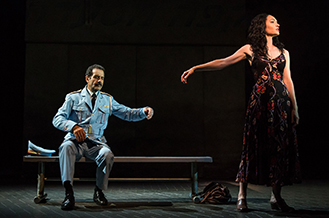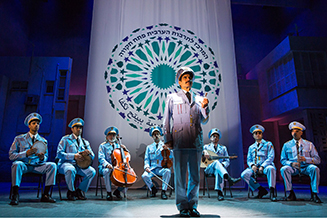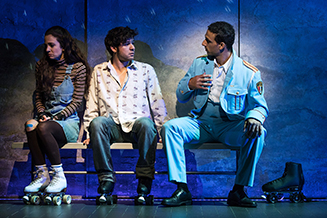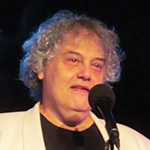The Band’s Visit
Ethel Barrymore Theatre, NYC, November 16, 2017
Reviewed by Elizabeth Ahlfors for Cabaret Scenes
Photos: Matthew Murphy

The Band’s Visit is a gently unassuming show that touches the heart. Now playing at the Ethel Barrymore Theatre, you may not walk out humming a tune. What you will remember is the yearning spirit of composer-lyricist David Yazbek’s score and its poignant warmth. You may be surprised at how this show, its people, and its music fill a need that is sorely missing in today’s socio-political turmoil and divisiveness.
Adapted from an award-winning 2007 Israeli film by Eran Kolirin, the stage version was written by Itamar Moses and directed by David Cromer. Opening the play is the Alexandria Ceremonial Police Orchestra, a group of eight musicians on their way to perform a goodwill concert at the Arab Culture Center in the Israeli city of Petah Tikva. Instead, they find themselves stranded in a sleepy desert hinterland, Bet Hatikhva.
The sudden appearance of strangers carrying musical instruments, formally dressed in sky-blue uniforms, catch the eye of the desert residents who then turn back to their languid lives where life is just “blah-blah-blah,” waiting for something to happen. (“But no one’s complaining, we’re experts at waiting.”) Yet, slowly, over the hours until the next bus arrives, the musicians find they are welcomed by the Israelis, who are supposed to be enemies, but are opening their homes, offering food and sharing their personal lives and desires that are surprisingly similar.

What emerges over the play’s 100 minutes are indications of the basic emotions universally shared, whether Israeli or Egyptian, whether in a “blah-blah-blah” desert town or a major city. With humor and incisiveness, Moses’ book elicits human longings for love and connection, and Yazbek’s haunting songs put the universal poetry of emotions to music.
The central characters are Tewfiq (Tony Shalhoub), the sober, straight-laced leader of the band, and Dina, the owner of a run-down cafe in Bet Hatikhva. Played by Katrina Lenk (Indecent), Dina’s blasé shell covers her fierce yearning for passion, adventure, and a life that has evaded her. Her husband has long abandoned her, and her married lover, Sammy (Jonathan Raviv), offers meager on-again, off-again satisfaction. Shrugging, she explains, “It Is What It Is.”
She is intrigued by Tewfiq, in a subtle portrayal by Shalhoub (The Price). He is a dignified widower, stifling a guilt that has prevented him to love again. Automatically, he first resists Dina’s invitation to show him the town, but then accepts her offer. They appear so different, the hemmed in and hesitant Tewfiq, and Dina, who follows her instincts. Watch her sprawl out in a chair, so distinct from Tewfiq’s straight posture. Somewhere, somehow, they recognize that each has something the other needs, evident in Dina’s haunting “Omar Sharif,” reminiscent of the film icon and hinting of romance.
In this only evening the Egyptians and Israelis share before the next bus arrives, we learn the urgent stories of various townspeople. A young Israeli couple (John Cariani and Kristen Sieh), stilted in their marital frustrations, into their confused life comes Simon (Alok Tewari), a clarinet player with a symphony he cannot finish.
There is “Telephone Guy” (Adam Kantor), who spends days at the town’s telephone booth waiting for a girl’s possible call.
Etai Benson plays the shy Papi, singing, “Papi Hears the Ocean” until he is encouraged by the romantic advice of trumpet player Haled (Ari’el Stachel) in “Haled’s Song About Love.” Haled first seems like a slick charmer until we learn how he dreads his upcoming arranged marriage.

Yet we are most drawn to the sweet possibilities for Shalhoub’s tender but restrained Tewfiq and Lenk’s Dina, her cool-warm demeanor hiding feelings that yearn for expression. Dina’s rendition of “Something Different” is perfect: “And I don’t know what I feel and I don’t know what all I know/All I know is I feel something different.”
David Cromer lets the characters illustrate their stories and lets their emotions touch us. Scenic designer Scott Pask’s turntable set efficiently shows various parts of the town, with lighting by Tyler Micoleau, and Maya Cirrocchi’s projections. Sarah Laux designed sky-blue uniforms for the Egyptian musicians and put the Israelis in well-worn summer clothes, including Dina’s flowing dress that lets her move gracefully as she walks with Tewfiq. The musicians intermittently add nuance with their bursts of American jazz into Middle Eastern music.
Last season, Come from Away was Broadway’s feel-good show. This season, The Band’s Visit, a seamless transfer from off-Broadway’s Atlantic Theater Company, is beautifully produced, bittersweet and haunting, far from political headlines, and a show not to be missed.





